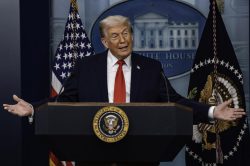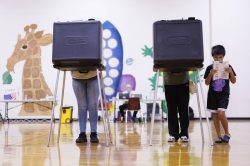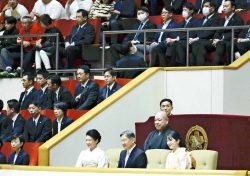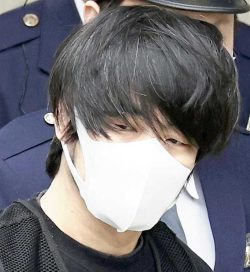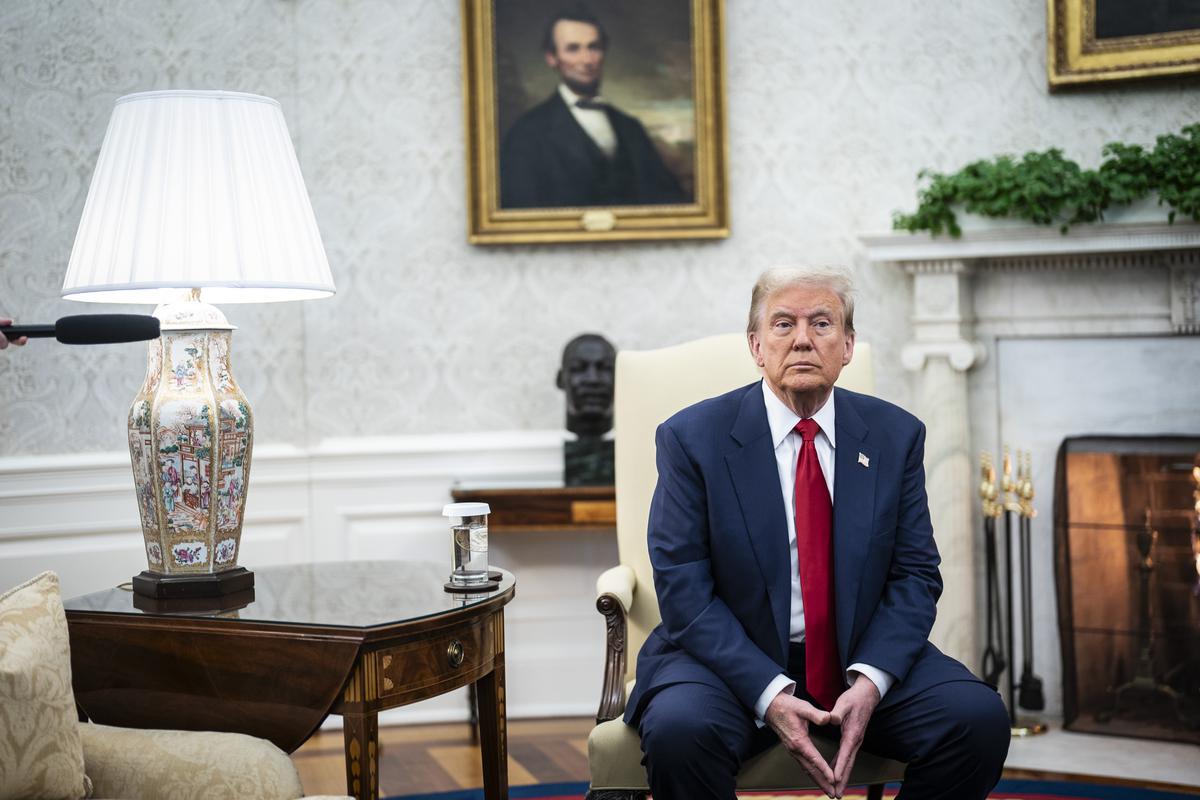
President Joe Biden meets with President-elect Donald Trump in the Oval Office on Nov. 13.
12:57 JST, November 27, 2024
Donald Trump entered the White House eight years ago with a Cabinet full of traditional conservative credentials, tapping some people he barely knew to help him learn his way around Washington.
Now the president-elect has rapidly assembled a different kind of team for his second term – enlisting people deeply critical of the agencies they will lead, bucking conservative orthodoxy with some of his picks and, above all, rewarding his most loyal allies.
“These are folks he knows well,” said Brian Ballard, a lobbyist and Trump ally. “He’s never going to question what’s the real agenda here. That’s no longer going to be the case.”
Trump’s Cabinet is almost complete just three weeks after his reelection, offering an unusually quick window into his plans and priorities for a second administration. After years of complaining about first-term staff members who resisted his ideas and ultimately denounced him, Trump has prioritized loyalty over traditional expertise in some positions and has elevated some supporters with little direct or managerial experience in the areas they are set to lead.
Rather than reflect a single political ideology, Trump’s selections show how he continues to reshape the GOP. There are plenty of traditional Republicans – but also a union-friendly pick for labor secretary and a pro-abortion-rights former Democrat tapped to lead health policy, among other unconventional choices. Trump’s advisers have touted that range of ideologies as a strength.
“I think he put together a different winning coalition, not a traditional Republican one,” said Marc Short, who was chief of staff to Vice President Mike Pence during Trump’s first term. “And so I think having a Cabinet that reflects that is probably appropriate.”
But Short called some of Trump’s picks “head-scratchers,” including the selection of Tulsi Gabbard, a former Democratic congresswoman and military veteran who endorsed Trump, for director of national intelligence. Short said there is room to nominate a “disrupter” without turning to Gabbard, who does not have direct experience in intelligence and whose sympathetic statements about Russia have drawn bipartisan scrutiny.
Trump spokeswoman Karoline Leavitt said in a statement that Trump’s reelection gave him “a mandate to implement the promises he made on the campaign trail – and his Cabinet picks reflect his priority to put America First.” She called his choices “highly-qualified.”
What’s unsurprising, to both supporters and critics of Trump, is his embrace of people who share his disdain for the government bureaucracy and hail from outside of it. He has tapped vaccine skeptics and strident critics of the U.S. government’s coronavirus response to lead health agencies. For the Defense Department, he turned to a veteran and Fox News host who has derided the military as “woke.”
“What you see here is a wholesale contempt for government,” said Ty Cobb, a White House lawyer during Trump’s first administration who has become a critic. He said the Cabinet picks echo the themes of Trump’s campaign, which derided the criminal cases against him as “lawfare.”
Trump has long accused a “deep state” within his first administration of thwarting his agenda, and his disdain toward federal agencies deepened after he left office, as the Justice Department pursued legal action against him. Now he plans to fire DOJ officials involved in the cases against him, The Washington Post previously reported, and stock the department with allies – including two of the attorneys who defended him against New York state charges of falsifying business records. Trump was convicted in that case.
Trump’s initial choice for attorney general, Matt Gaetz, had called to defund federal agencies that “do not come to heel.” When Gaetz stepped aside amid scrutiny of sexual misconduct allegations, which Gaetz has denied, Trump turned to former Florida attorney general Pam Bondi, a longtime supporter who declared after Trump was criminally charged that the “investigators will be investigated.”
Bondi is one of several picks for top roles who hail from Trump’s adopted home state of Florida. The Cabinet is also mostly White. The exceptions include: secretary of state pick Sen. Marco Rubio (R-Florida) and labor secretary pick Rep. Lori Chavez-DeRemer (R-Oregon), who are Hispanic; Gabbard, who is American Samoan; and housing and urban development secretary pick Scott Turner, who is Black.
But Trump’s selections also include some milestones. Susie Wiles, his former campaign manager, will become the first female White House chief of staff. And Trump’s pick for treasury secretary, Scott Bessent, would be the first openly gay person to hold the job.
The jockeying to lead the Treasury Department was especially intense, with Trump transition co-chair Howard Lutnick lobbying for the job with support from billionaire Trump ally Elon Musk. Trump ultimately announced plans to put Lutnick in charge of the Commerce Department.
The Cabinet officials working on economic policies, such as Bessent and Lutnick, will be tasked with advancing policy goals that are sometimes in conflict. Trump is threatening steep tariff hikes, but also promising to lower inflation for consumers.
“There is an unusual amount of uncertainty right now about what economic policy will look like under President Trump,” said Michael Strain, an economist at the center-right think tank American Enterprise Institute.
Trump’s selection of Chavez-DeRemer, a Republican congresswoman from Oregon, sparked concerns among economic conservatives and Wall Street because of her support for pro-union legislation and relationships with organized labor. Randi Weingarten, president of the American Federation of Teachers – a villain to many Republicans – called Chavez-DeRemer’s selection “significant” and lauded her support for workers.
The pick makes sense, some political observers said, as Trump has shifted the GOP in a populist direction and reached out to labor leaders. The Teamsters union declined to make an endorsement in the presidential race, departing from its usual support for Democrats, and Teamsters President Sean O’Brien – who last week praised Chavez-DeRemer – spoke at the Republican National Convention.
At the same time, Trump continues to give billionaire allies, such as Musk, huge influence.
“This is already going to be like watching an episode of ‘The Apprentice,’” said Yale management professor Jeffrey Sonnenfeld. “Trump likes conflict, and he’s building conflict into his Cabinet.”
Musk and former GOP presidential candidate Vivek Ramaswamy, another businessman, are charged with cutting federal costs through an outside-of-government commission – another arm of Trump’s slash-and-burn agenda. They see a potential ally in Russ Vought, Trump’s pick to run the White House budget office, who served in Trump’s first term and has taken an aggressive view of the president’s powers.
The inclusion of allies such as Vought – a staunch social conservative – could help counter some Republicans’ skepticism about other picks such as Robert F. Kennedy Jr., Trump’s unconventional choice for secretary of health and human services. Kennedy channels many Republicans’ skepticism of public health officials but diverges from the GOP on issues such as abortion.
Kristan Hawkins, the president of the antiabortion group Students for Life, projected optimism about a second Trump administration on Monday, saying she sees “a team committed to curing the cancer of weaponized government.” She said she still hopes to see new scrutiny of abortion pills but that “step one” is defunding Planned Parenthood, a goal with wider Republican support.
The speed with which Trump assembled his Cabinet underscores a level of preparation he lacked in 2016, when he was widely expected to lose to Hillary Clinton, supporters said.
“He did not have a network (in 2016),” said Brian Riedl, a senior fellow at the Manhattan Institute and a former Republican congressional aide. “He relied on Washington old hands and the conservative establishment to help staff his administration, and in many ways, he wound up regretting that.”
Now, Riedl said, Trump has “a full network of loyalists and career opportunists who are willing to be much more flexible with policy choices.”
Top Articles in News Services
-

Prudential Life Expected to Face Inspection over Fraud
-

South Korea Prosecutor Seeks Death Penalty for Ex-President Yoon over Martial Law (Update)
-

Trump Names Former Federal Reserve Governor Warsh as the Next Fed Chair, Replacing Powell
-

Suzuki Overtakes Nissan as Japan’s Third‑Largest Automaker in 2025
-

Japan’s Nikkei Stock Average Alls from Record as Tech Shares Retreat; Topix Rises (UPDATE 1)
JN ACCESS RANKING
-

Univ. in Japan, Tokyo-Based Startup to Develop Satellite for Disaster Prevention Measures, Bears
-

JAL, ANA Cancel Flights During 3-day Holiday Weekend due to Blizzard
-

Japan Institute to Use Domestic Commercial Optical Lattice Clock to Set Japan Standard Time
-

China Eyes Rare Earth Foothold in Malaysia to Maintain Dominance, Counter Japan, U.S.
-

Japan, Qatar Ministers Agree on Need for Stable Energy Supplies; Motegi, Qatari Prime Minister Al-Thani Affirm Commitment to Cooperation




